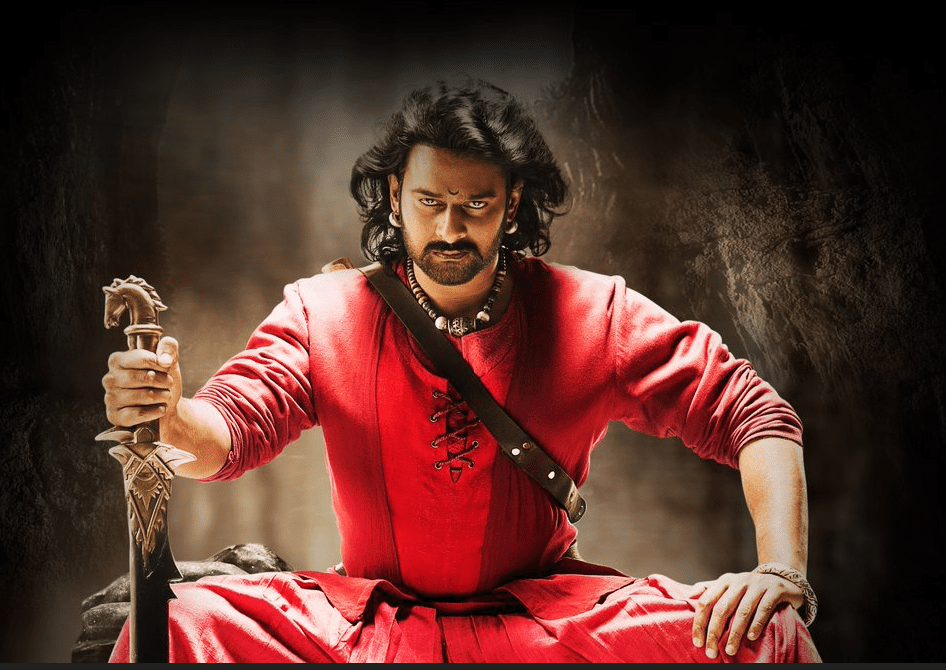Bahubali: The Beginning (2015) – Cinematic Journey
Release Date: “Bahubali: The Beginning,” the magnum opus directed by S. S. Rajamouli, hit the silver screen on July 10, 2015. The film marked a significant milestone in Indian cinema, setting new standards in terms of scale, grandeur, and storytelling.
Budget: One of the most expensive films made in India, “Bahubali: The Beginning” had a staggering budget of approximately ₹180 crores (about $25 million USD). The film’s ambitious vision required massive investments in production, special effects, and the creation of elaborate sets that transported audiences to the fictional kingdom of Mahishmati.
Cast: The film boasted a stellar ensemble cast, featuring some of the most acclaimed actors in the Indian film industry:
- Prabhas as Amarendra Bahubali / Mahendra Bahubali: The protagonist of the film, Prabhas portrayed the dual roles of father and son, showcasing his versatility as an actor.
- Rana Daggubati as Bhallaladeva: The formidable antagonist, Rana Daggubati’s powerful portrayal of Bhallaladeva added depth to the character, making him a memorable villain.
- Anushka Shetty as Devasena: Anushka Shetty played the role of Devasena, the leading lady, whose character played a pivotal role in the film’s narrative.
- Tamannaah as Avanthika: Tamannaah brought life to the character of Avanthika, a warrior princess, with her strong screen presence.
- Ramya Krishnan as Sivagami: Ramya Krishnan’s portrayal of Sivagami, the queen mother, was lauded for its intensity and conviction.
- Nassar as Bijjaladeva: Nassar’s performance as Bijjaladeva, a cunning and manipulative character, added layers to the film’s intricate plot.
The Epic Tale Unfolds
“Bahubali: The Beginning” is a historical fiction film that takes the audience on a gripping journey through the mythical kingdom of Mahishmati. The narrative is framed as a flashback, with a mysterious woman introducing the tale to two young men in a waterfall.
The story revolves around the two cousins, Amarendra Bahubali and Bhallaladeva, who are destined for greatness. However, a complex web of deceit, betrayal, and power struggles ensues, leading to a fierce rivalry between the two. Sivagami, the queen mother, plays a crucial role in shaping their destinies.
The film explores themes of love, duty, and the quest for justice. Amarendra Bahubali, known for his righteousness and valor, captures the heart of Devasena, a fearless and independent woman. The unfolding events set the stage for a power struggle within the royal family, culminating in a dramatic climax that leaves the audience eagerly anticipating the sequel.
The Visual Extravaganza: What sets “Bahubali: The Beginning” apart is its visual spectacle. The film’s grandeur is evident in its breathtaking visuals, intricate set designs, and awe-inspiring special effects. The kingdom of Mahishmati is brought to life with meticulous attention to detail, creating a world that captivates the audience from the opening scene.
The action sequences, choreographed with precision, showcase the protagonists’ combat skills and the intensity of their conflicts. From epic battle scenes to intimate moments, the cinematography by K. K. Senthil Kumar captures the essence of the narrative, elevating the viewing experience to new heights.
The use of CGI (Computer-Generated Imagery) in “Bahubali: The Beginning” was groundbreaking for Indian cinema. The film’s team collaborated with international experts to ensure that the visual effects were on par with global standards. The result was a seamless blend of live-action and CGI, creating mythical creatures, vast landscapes, and epic war sequences that left audiences in awe.
Musical Mastery: The music of “Bahubali: The Beginning” played a pivotal role in enhancing the film’s emotional impact. Composed by M. M. Keeravani, the soundtrack featured a symphony of melodies that complemented the narrative and added depth to the characters.
The song “Dhivara,” with its haunting melody and powerful lyrics, became an anthem of sorts, resonating with the audience long after they left the theaters. The film’s music not only heightened the dramatic moments but also contributed to the cultural impact of “Bahubali: The Beginning.”
Critical Acclaim and Box Office Triumph
Upon its release, “Bahubali: The Beginning” received widespread critical acclaim for its visionary storytelling, stunning visuals, and exceptional performances. Critics praised the film for pushing the boundaries of Indian cinema and delivering a cinematic experience unlike anything seen before.
The box office performance of “Bahubali: The Beginning” was nothing short of historic. The film shattered records, becoming one of the highest-grossing Indian films of all time. Its success was not limited to the domestic market; the movie gained international recognition, drawing audiences from various parts of the world.
The unprecedented success of “Bahubali: The Beginning” paved the way for the sequel, “Bahubali: The Conclusion,” which was eagerly anticipated by fans worldwide.
Legacy and Impact: “Bahubali: The Beginning” left an indelible mark on the landscape of Indian cinema. Its success demonstrated the potential of Indian filmmakers to create world-class cinema that could compete on the global stage. The film’s impact extended beyond the box office, influencing the way Indian films were perceived internationally.
The characters of Bahubali and Bhallaladeva became iconic, with their dialogues and mannerisms etching themselves into popular culture. The success of the film also prompted discussions about the potential of the Indian film industry to produce high-budget, high-quality films that could compete with Hollywood blockbusters.
The legacy of “Bahubali: The Beginning” was not just financial; it was a cultural phenomenon that ignited a sense of pride and excitement among Indian moviegoers. The film’s success paved the way for other filmmakers to dream big and push the boundaries of storytelling and production in Indian cinema.
Conclusion: In conclusion, “Bahubali: The Beginning” stands as a landmark in Indian cinema, a testament to the power of vision, storytelling, and the collaborative efforts of a dedicated team. The film’s release date, budget, cast, and the epic narrative created a cinematic experience that captivated audiences and left an enduring legacy. As the beginning of a two-part saga, “Bahubali: The Beginning” set the stage for the grand conclusion in “Bahubali: The Conclusion,” solidifying its place in the annals of Indian film history.
LEO BOX OFFICE COLLECTION AND BUDGET (2023) MOVIE: SURPRISING FACTS AND FIGURES
The Anticipation Builds: “Bahubali: The Conclusion”
Following the immense success of “Bahubali: The Beginning,” the anticipation for the sequel, “Bahubali: The Conclusion,” reached a fever pitch. The audience was eager to unravel the mysteries left in the wake of the first installment’s gripping climax. The release date of April 28, 2017, became a cinematic event, with fans counting down the days to witness the epic conclusion to the Bahubali saga.
Budget Soars Higher: Building on the foundation laid by its predecessor, “Bahubali: The Conclusion” boasted an even more extravagant budget, reportedly exceeding ₹250 crores (approximately $33 million USD). The increased investment reflected the filmmakers’ commitment to delivering a sequel that not only met but exceeded the monumental expectations set by the first film.
The Culmination of a Saga: “Bahubali: The Conclusion” picks up where “The Beginning” left off, delving into the reasons behind Kattappa, a loyal warrior, betraying and killing Amarendra Bahubali. The film seamlessly weaves together the past and present, revealing the intricacies of the characters’ relationships and the consequences of their actions.
The narrative unfolds with Mahendra Bahubali (Shivudu), son of Amarendra Bahubali, vowing to avenge his father’s death and reclaim the throne of Mahishmati. The film explores themes of sacrifice, destiny, and the eternal struggle between good and evil. The intricately woven plot keeps the audience on the edge of their seats, with every revelation deepening the emotional resonance of the characters.
Visual Spectacle Continues: If “Bahubali: The Beginning” set a benchmark for visual excellence, “The Conclusion” raised the bar even higher. The sequel featured awe-inspiring visuals, larger-than-life sets, and groundbreaking special effects that pushed the boundaries of what was thought possible in Indian cinema.
The climactic battle sequences, including the iconic clash between Bahubali and Bhallaladeva, were a testament to the filmmakers’ commitment to delivering a cinematic experience that rivaled international standards. The attention to detail in crafting the fictional world of Mahishmati contributed to the film’s immersive quality, transporting audiences to a realm of grandeur and fantasy.
Emotional Resonance and Character Development: While “The Conclusion” continued to dazzle with its visual prowess, it also delved deeper into the emotional core of the characters. Prabhas, reprising his roles as Amarendra Bahubali and Mahendra Bahubali, showcased a range of emotions, from the nobility of a king to the determination of a son seeking justice. Rana Daggubati’s portrayal of Bhallaladeva continued to be menacing, adding layers to the complexity of the character.
The women of “Bahubali: The Conclusion” played pivotal roles in shaping the narrative. Anushka Shetty’s Devasena emerged as a symbol of resilience and strength, while Ramya Krishnan’s Sivagami faced the consequences of her decisions. The character arcs were carefully crafted, allowing each member of the ensemble cast to contribute to the emotional resonance of the film.
Musical Extravaganza Continues: M. M. Keeravani returned to compose the soundtrack for “Bahubali: The Conclusion,” and once again, the music elevated the cinematic experience. The haunting melodies, anthemic choruses, and soul-stirring background score complemented the film’s emotional beats, enhancing the impact of key moments.
Songs like “Saahore Baahubali” became anthems of heroism, resonating with audiences and contributing to the film’s cultural impact. The synergy between the visuals and the music created an immersive experience that lingered in the minds of viewers long after the credits rolled.
Global Triumph and Cultural Impact: “Bahubali: The Conclusion” not only met but exceeded the sky-high expectations set by its predecessor. The film received universal acclaim for its storytelling, visuals, and performances. The global box office numbers soared, cementing its status as one of the highest-grossing Indian films of all time.
The success of the Bahubali saga transcended geographical boundaries, with audiences around the world embracing the epic tale. The film’s impact on Indian cinema was transformative, opening doors for international collaborations, expanding the scope of storytelling, and proving that Indian filmmakers could create content with global appeal.
A Cinematic Legacy: The Bahubali saga, with its compelling characters, grand visuals, and epic storytelling, left an enduring legacy in the world of cinema. The two films stand as a testament to the vision of director S. S. Rajamouli, the dedication of the cast and crew, and the limitless possibilities of storytelling in Indian cinema.
The success of “Bahubali: The Beginning” and “Bahubali: The Conclusion” sparked a renewed sense of pride and confidence within the Indian film industry. Filmmakers began to dream bigger, exploring diverse genres, and pushing the boundaries of storytelling, knowing that the audience’s appetite for quality cinema had expanded.
Conclusion: In conclusion, the Bahubali saga, encompassing “The Beginning” and “The Conclusion,” represents a watershed moment in Indian cinema. The films not only redefined the scale and scope of filmmaking but also demonstrated the global appeal of Indian storytelling. The release dates, budgets, cast, and the epic narratives of these films have left an indelible mark on the cinematic landscape, solidifying their place as cultural phenomena that continue to resonate with audiences worldwide. As the credits rolled on “Bahubali: The Conclusion,” the legacy of the epic saga lived on, inspiring future generations of filmmakers to reach for the stars and create cinematic wonders that captivate the imagination.



